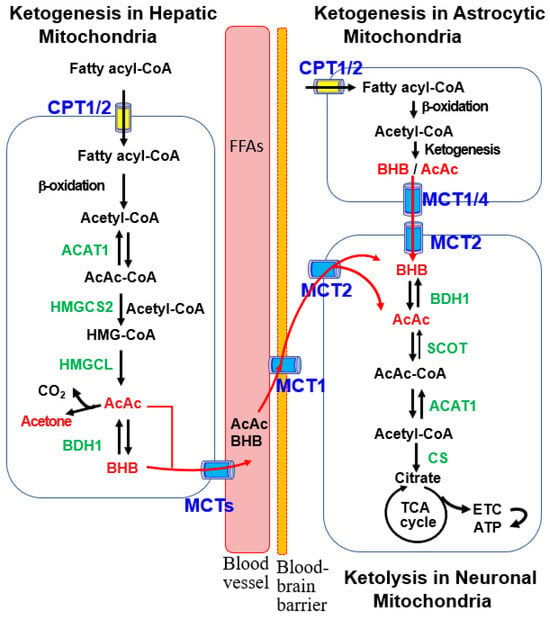Exploring the Neuroprotective Powers of Ketone Bodies and the Ketogenic Diet

Hey there! Let's dive into something truly fascinating - a groundbreaking study that could change the way we think about brain health and neurodegenerative diseases. Imagine a world where your diet could be your shield against conditions like Alzheimer’s and Parkinson’s. Intrigued? Let’s unpack this together!
The Study at a Glance
- The Research Paper: "Molecular Mechanisms of Neuroprotection by Ketone Bodies and Ketogenic Diet in Cerebral Ischemia and Neurodegenerative Diseases" led by Jiwon Jang and team.
- Published In: The reputable International Journal of Molecular Sciences.
- Publication Date: A fresh-off-the-press December 2023 issue.
- The Crux: This study explores how ketone bodies (KBs) and the ketogenic diet (KD) act as guardians for our brain, particularly against cerebral ischemia and neurodegenerative diseases.
Understanding the Basics
- What are Ketone Bodies (KBs)? These are acetone, acetoacetate (AcAc), and β-hydroxybutyrate (BHB). Think of them as your body's plan B for energy when glucose is playing hard to get.
- The Ketogenic Diet: High in fat, moderate in protein, low in carbs - this diet is not just a fad; it's a science-backed nutritional approach that leads to nutritional ketosis.
- Brain Energy and Metabolism: Our brain is like a fuel-guzzling machine, and KBs synthesized in the liver become VIPs during fasting, powering about 60-70% of the brain's energy needs.

Why This Matters for Neurological Diseases
- Targeting Neurodegenerative Diseases: It's a big deal because this study shows how KBs and KD might just be the game-changers in treating Alzheimer's (AD) and Parkinson's (PD).
Zooming into Alzheimer’s Disease
- AD Explained: Picture a brain gradually getting entangled in amyloid plaques and tau tangles, leading to memory loss and cognitive decline. That's AD for you.
- KBs and KD to the Rescue: Studies suggest these dietary heroes can reduce oxidative stress and improve energy utilization, potentially improving cognitive functions in AD.

Tackling Parkinson’s Disease
- Understanding PD: Imagine your brain's motor control center losing its key players, the dopaminergic neurons. This leads to tremors, balance problems, and more.
- The KB/KD Effect: They're showing potential in reducing neuron loss and improving symptoms. It's like giving your brain's motor control center a much-needed boost.

The Science Behind the Magic
KBs as Brain Fuel
- An Alternative Energy Source: KBs step up when glucose metabolism goes haywire in the brain, which is a key issue in AD and PD.
- Efficiency at Its Best: BHB, a type of KB, is like a high-octane fuel for the brain during nutritional deficiencies, keeping brain functions stable.

Boosting Mitochondrial Function
- Mitochondria - The Powerhouses in Peril: In neurodegenerative diseases, these powerhouses struggle, leading to reduced brain energy. Enter KBs and KD, which come to the rescue by enhancing mitochondrial function.

Warding Off Cell Death and Damage
- The Anti-Apoptotic and Antioxidant Duo: KBs and KD are like the dynamic duo fighting oxidative stress and preventing apoptosis, key factors in neurodegenerative progression.
- Guarding the Brain: By improving mitochondrial function, they protect neurons from damage in conditions like cerebral ischemia, AD, and PD.

Epigenetic and Post-Translational Heroes
- Genetic Guardians: These diets don’t just stop at energy. They go deeper, affecting gene expression and enzyme activity through epigenetic and post-translational modifications.
- Rewriting the Script: By influencing histone acetylation and DNA methylation, they're like scriptwriters, changing the narrative of brain cell health and longevity.

The Big Picture – Why This Is a Game Changer
So, why is this study so groundbreaking? Well, it's like finding a natural, diet-based toolkit for our brain's health. The potential implications are huge:
- Revolutionizing Treatment: Imagine managing neurodegenerative diseases with dietary changes. This could lead to more natural, accessible treatments.
- Beyond Medications: While drugs are crucial, adding KBs and KD could provide a complementary approach, offering a holistic way to tackle brain health.
- New Hope: For those facing neurodegenerative diseases, this research offers a new avenue of hope and empowerment through dietary choices.
In Conclusion
Jiwon Jang and team have opened our eyes to the incredible potential of ketone bodies and the ketogenic diet in neuroprotection. It’s like discovering a secret weapon hidden in our meals and metabolism. As we continue to explore and understand these findings, the future of treating and managing neurodegenerative diseases looks brighter and more hopeful.
So, what do you think? Could your next meal be your brain’s new best friend in fending off neurodegenerative diseases? Let's chew on that thought!
SOURCES


